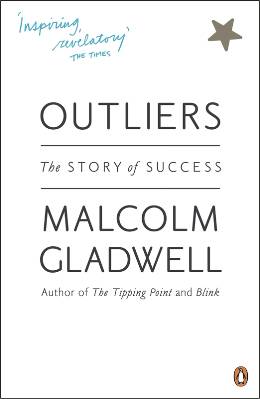Gladwell provides us with some ideas about why some people are good at certain tasks, and others are not. But neither the hypotheses nor the arguments are convincing. Some case stories are interesting, though.
Malcolm Gladwell has had some international success with earlier books — The Tipping Point (2000) and Blink (2005). A more recent book is Outliers (2008), with subtitle “The story of Success”. One short statement about the authors intention is: A successful person is a person that happened to to be in the right place at the right time; not a person that through sheer effort succeeded, despite adverse circumstances.
A consequence is that the phrase “a self-made man”, though often heard,is misleading. The first set of examples comes from junior league team sports. The best players are more likely to be born in the first months of the year than in the last months of the year. So a poor young boy born in October is less likely to advance to the major league than a boy born in February. The age difference give an advantage to those born early in the year, an advantage that is then amplified through special training after being positively selected by talent scouts. Well, this observation is, at least in our times, fairly well-known. It has been observed in the educational system, where the near one-year difference between children at the same educational stage can have major effects in terms of the pupils ability to abstract and learn.
Other themes that are discussed by Gladwell are: The 10,000-hour rule (it takes 10,000 hours of training and practice to get really good at your job); successful genius (you need social competence, if your expertise should bring advantages to you); demographic evolution (decreasing birthrate can be a bonus); your a descendant of your culture (the values of your ancestors shape your value system); etc.
So, how does it work out … the book as an argument for some thesis or two? Not as solid as could be hoped for. In hindsight, it is a collection of “observations” that is configured to serve as the evidence for the hypotheses. But it dos not really work that way. The theses themselves are never clearly stated, so it is difficult to understand when or if any of them has been “proved”. And the matter of causes-and-effects is not really evaluated. Should things of type A really be regarded as causes of things of type B? Or are they just correlated, perhaps through a third factor that is the real cause? Or is it not even a correlation? Are the concrete examples that Gladwell offers just a biased selection, and a broader selection would disprove the hypotheses?
A reader with a critical stance would say that Gladwell has not proven his main points. There are, though, some examples of patterns that are worthy of being exposed and maybe even further explored. So that may be one kind of value of the book. A reader can digest a number of case stories that seem to contain grains of insights into human behavior. Which is an entertaining way of spending some hours of your time.
Conclusion: The author (and especially the publisher) promises more than is delivered. Some speculations dressed up as hypotheses receive anecdotal evidence, which does not constitute scientific proofs.
Data: Malcolm Gladwell: “Outliers” (Penguin Books, 2009), ISBN 9780141043029 (book at openlibrary.org)

Leave a comment